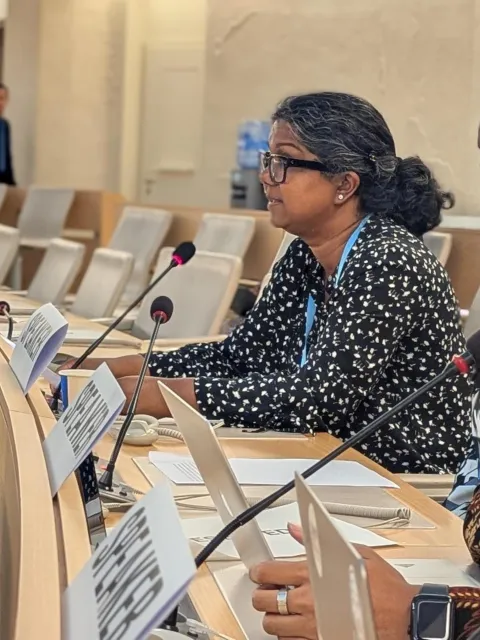NCD Alliance: a strategic union for health
Cary Adams, CEO of UICC steps down after ten years as Member of the Board of Directors at the Non-Communicable Diseases Alliance (NCDA), an opportunity to look back at a decade of growth and achievements.

Cary Adams, CEO of UICC, with Katie Dain, CEO of NCDA and Dr Tedros Adhanom Ghebreyesus, Director-General of WHO, at the signing of a Memorandum of Understanding with the World Health Organization to formalise over ten years of existing close collaboration on the prevention and control of noncommunicable diseases (NCDs).
HIGHLIGHTS
- In the past 10 years, the NCD Alliance (NCDA) has made significant progress in advocating for global health, leading to the placement of non-communicable diseases (NCDs) on the global health agenda and the adoption of nine global targets and 25 indicators for NCD prevention and treatment in 2012.
- In 2015, NCDA helped ensure that NCDs were recognised as a priority in the UN 2030 Agenda for Sustainable Development, which has the potential to transform the NCD response in low- and middle-income countries (LMICs) and foster new partnerships and capabilities across the sustainable development community.
- NCDA Alliance has also increased its focus on national and regional action on NCDs since 2015, initiating a strategic plan that includes capacity development services for national and regional leaders, and advocacy efforts resulting in policy changes such as Mexico's sugar tax and Pakistan's trans fat restrictions.
Civil society organisations (CSOs) engaged in reducing the burden of non-communicable diseases (NCDs) often complain that progress has been painfully slow – and it has, especially when life-saving solutions are so clear and within our reach. But looking back over the past ten years, it can also not be denied that the NCD movement has seen some major wins - and that the NCD Alliance has played a big part in achieving them.
In 2009, the strategic union of UICC, the International Diabetes Federation, the World Heart Federation and the International Union Against Tuberculosis and Lung Disease (The Union) marked the beginning of NCDA.
While NCDs had been making appearances on the global health agenda since the 80s, NCDA began leading global advocacy efforts ahead of the first UN High-Level Meeting on NCDs in 2011, resulting in a big breakthrough in placing NCDs on the global health agenda.
This was followed by governments agreeing to a first set of global NCD targets in November 2012, after nearly two years of consultations, negotiations and sustained advocacy by the NCD Alliance and partners.
This ambitious set of nine global targets and 25 indicators addressing prevention and treatment showed what “people power” can do when allies work together for a common cause.
In 2015, another major milestone took place. Thanks to the joint and concerted advocacy of NCDA’s global network, NCDs were recognised as a priority in the UN 2030 Agenda for Sustainable Development. This was a long-term advocacy goal that the NCD Alliance had set out to achieve when formed in 2009.
This recognition broadened the potential to transform the NCD response in low- and middle-income countries (LMICs), as well as to unlock new partnerships, capabilities and funding across the sustainable development community. Above all, the Sustainable Development Goals (SDGs) signalled a commitment by political leaders to “do things differently”, to address universal and intergenerational issues through synergies rather than in silos.
A global voice for NCD civil society
Further essential work was – and continues to be – ensuring that these global commitments are translated into national action and implementation. For this reason, NCDA initiated in 2015 an important shift in its strategic focus. While pursuing global advocacy, the organisation scaled up its efforts to support national and regional action on NCDs, notably to strengthen civil society’s capacity to demand action, influence the policy environment and monitor progress.
For this reason, the new Strategic Plan 2016-2020 signalled an increased portfolio for capacity development services for national and regional NCD leaders, CSOs and alliances, including tools and guidance documents, technical assistance, training workshops, seed grant programmes, networking and twinning initiatives.
The support for national and regional advocacy contributed to some notable wins, for instance with a sugar tax in Mexico, trans fats in Pakistan and NCD care in Africa.
Initiatives such as ‘Our Views, Our Voices’, the ‘NCD Diaries’ and the ‘Global Charter for Meaningful Involvement of People Living with NCDs’, also played significant roles in defending the interests of people living with NCDs. And the NCDA’s Global Week for Action on NCDs, launched in 2018, further asserted NCDA’s reputation as the convening, coordinating global voice of NCD civil society.
Looking back, looking forward
In response to the COVID-19 pandemic, NCDA pivoted many of its main functions to virtual platforms, including capacity development training programmes, high-level advocacy events, and media briefings for journalists.
To strengthen civil society through the crisis, NCDA created the ‘Civil Society Solidarity Fund on NCDs and COVID-19’ in July 2020, which supported 20 national and regional NCD alliances.
In the coming decade, NCDA will be engaging with a broad range of sectors and partners in pursuing its advocacy efforts, and leveraging platforms beyond the health sector to support countries in meeting their global NCD targets.
Last update
Friday 21 July 2023
